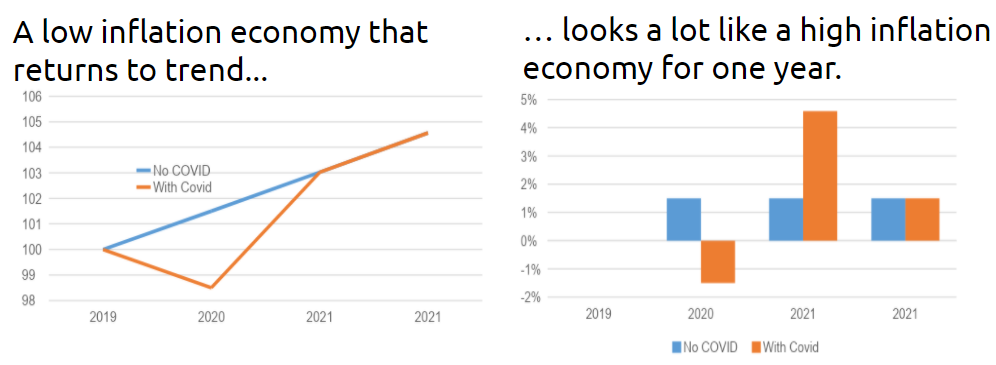The most important question for 2021: Inflation or Deflation?
There are plenty of inflationistas who have been forecasting an apocalypse for a dozen years. They are about to have their day in the sun. And you can bet they will be appearing in financial media to proclaim vindication.
But even stopped clocks are right occasionally. Inflation will appear over the next few months, bouncing back from 2020 deflation. The most important question is whether inflation is back to stay, or if it will be a fleeting visit.
Either way, there will be an investment impact. It is easy for markets to believe central banks that "interest rates will be on hold for an extended time" when inflation is well below central bank targets. It will be much harder when inflation is above target, even if the belief is that it will only be temporary.
Is there an inflation boom coming?
At the headline level, almost certainly for the short term.

The deflationary forces that existed before COVID are still arrayed against inflation:
- Elevated unemployment meaning low wage growth
- Low inflation expectations are embedded for consumers and companies. This means workers are less likely to demand pay raises, and companies are less likely to increase prices.
- Technology advances force prices lower.
- Globalisation is leading to a flatter supply curve. i.e. there are likely to be other suppliers in different countries willing to discount, which prevents prices from rising.
- High levels of debt. Paying down substantial debt balances means constrained spending, which means weak demand.
- Increasing inequality. Lower-income households are more likely to spend higher-income to save. If the rich are getting richer, then savings remain strong, demand remains weak.
The inflationary forces are mostly temporary:
- Shortages from supply chain disruptions and lockdowns. These see product shortages / higher prices for a short time until workers resume/lockdowns end.
- Structural changes in consumption following COVID. As people change habits, product shortages / higher prices result until enough production emerges to satisfy the new demand levels.
- Structural changes in supply chains following COVID. There is a renewed interest in preventing supply chain disruptions. This will likely mean countries encourage domestic production of essential goods, even if they are higher cost. Many industries run just-in-time inventories to save money. To reduce disruptions, many will increase their stock at hand, increasing prices.
- Inventory cycle rebuild. Globally, inventories have decreased during COVID. There will temporarily be greater demand for goods as restocking occurs.
- Government stimulus giving money to people who aren't working. By giving money to people who aren't working, you increase demand for goods and services from those who are working. Then, prices rise, and employers hire people to keep up with the increased demand.
- Lower US dollar. The US dollar is almost 10% lower than last year, translating to higher prices on imports.
The most significant risk to our expectation that deflationary forces will take over is in US politics. The critical factor to watch is infrastructure. If the spending program that emerges is around the mooted size of 2% of GDP for ten years, it might meaningfully affect inflation.
A secondary factor is minimum wages. There will be political hurdles to passing Biden's preferred $15 target. However, the trajectory is clear. We do not think that minimum wage increases are particularly inflationary, but they will help.
Invest like inflation is coming, be ready to change your mind
The competing factors above lead to two main scenarios:
- Inflation gets the upper hand, bond yields rise, and value stocks perform well. Growth stocks fall, quality stocks underperform.
- Deflation/disinflation resumes after a short inflationary shock. Bond yields fall, bond prices rise. Defensive stocks outperform, as does quality. Value stocks and financials underperform. Growth stocks are more complicated.
I'm expecting the first to occur before morphing into the second. The question is how long this takes.
Without stimulus, we will be back to the second scenario tomorrow.
With the current stimulus, I'm thinking six to twelve months. With two disclaimers:
- the market keeps surprising with how quickly it is incorporating new regimes,
- the more (well-targeted) stimulus that is added, the longer we will stay in the first scenario.
Never miss an update
Hit the 'follow' button below to be notified every time I post a wire or hit the 'like' button to let us know you enjoyed it. Not already a Livewire member? Sign up today to get free access to investment ideas and strategies from Australia’s leading investors.

